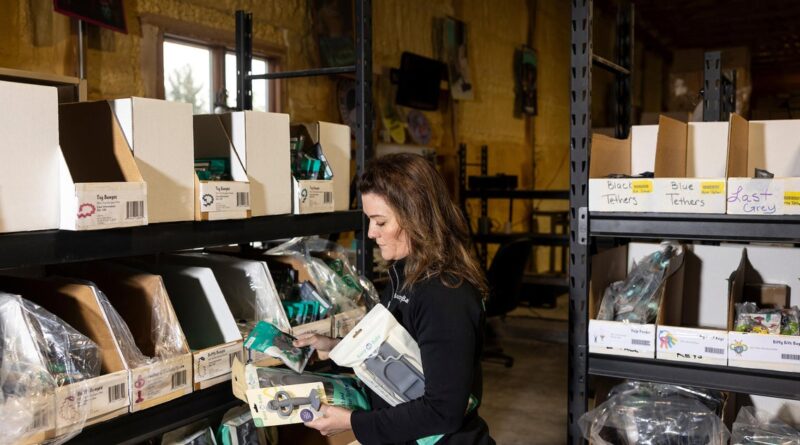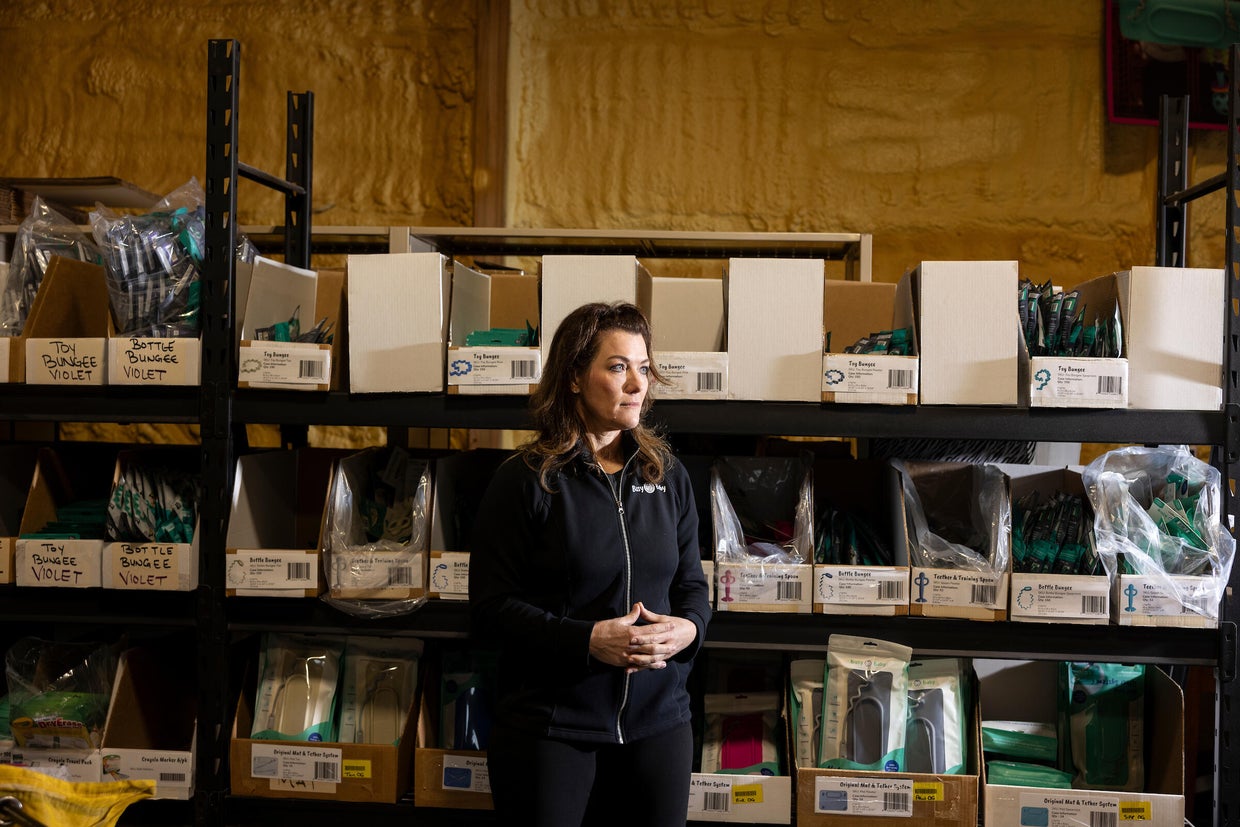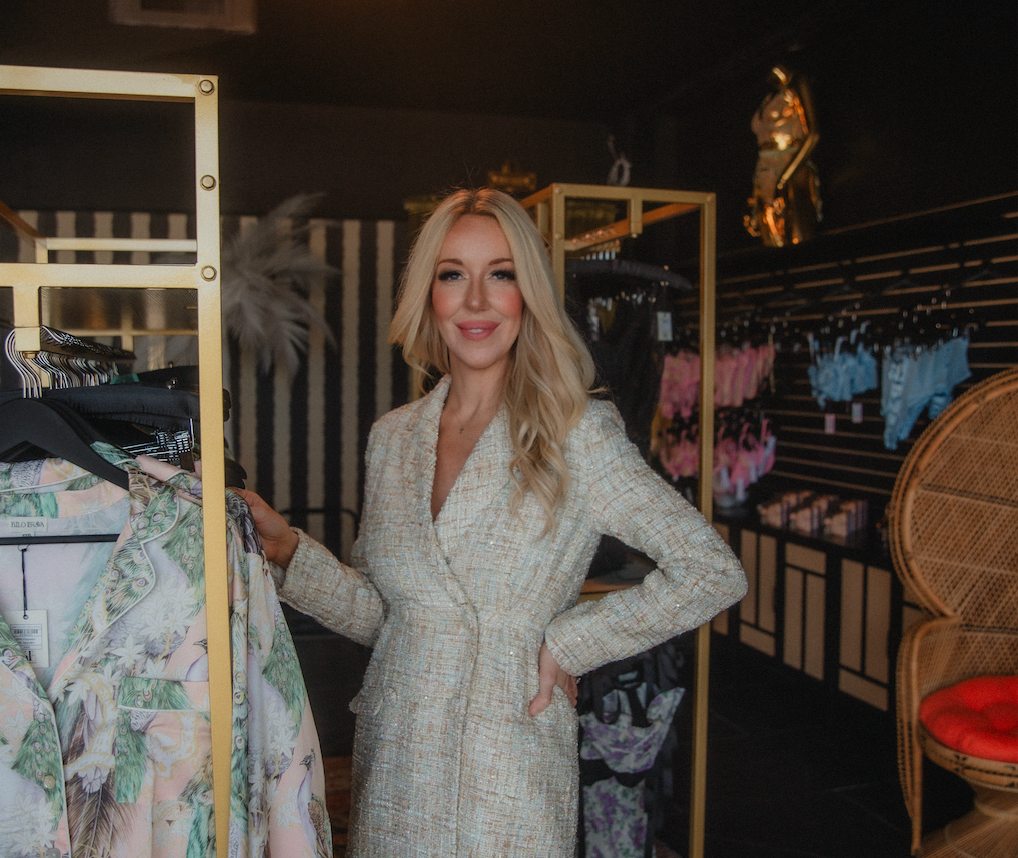Small business owners say economic uncertainty is worse than tariffs. Here’s why.
Small business owners worry that mounting economic uncertainty, driven largely by President Trump’s shifting tariff policies, could shut their doors for good.
Beth Benike, cofounder of Busy Baby, told CBS MoneyWatch that a lack of clarity on the direction of U.S. tariffs poses serious problems for the Oronoco, Minnesota-based retailer.
“I am a problem solver. When a decision or policy comes out, I’ll find a solution. I will work with it or around it,” said Benike, whose company makes nonslip placemats and other products for babies. “The next day, the policy changes and that plan doesn’t make sense anymore, so I come up with something else.”
Jenn Ackerman / The New York Times
Smaller enterprises that rely on imported goods and packaging from China, which now faces U.S. tariffs of as high as 145%, are among the most concerned about Mr. Trump’s trade policies. But a prolonged period of economic uncertainty alone can prove fatal, obscuring future borrowing costs, dampening consumer spending, and otherwise hindering the strategic planning and managerial decision-making involved in running a small business.
Trump administration officials have staunchly defended their economic policies.
“Just as it did during President Trump’s first term, the administration’s America First economic agenda of tariffs, deregulation, tax cuts and the unleashing of American energy will restore American Greatness from Main Street to Wall Street,” White House spokesman Kush Desai told CBS MoneyWatch in a statement.
Recently, however, tremors in the economy intensified by Mr. Trump’s tariffs have eroded the optimism of small businesses, according to a closely watched confidence gauge.
“The implementation of new policy priorities has heightened the level of uncertainty among small business owners over the past few months,” William Dunkelberg, chief economist of the National Federation of Independent Businesses, said in a statement.
The decline in optimism comes as Mr. Trump’s economic agenda roils financial markets and raises concerns about slowing U.S. economic growth.
“Consumers are concerned about the inflationary effects of the tariffs hikes. They understand if prices rise, their real spending power will go down,” Steven J. Davis, a Stanford University economist who co-developed an economic policy uncertainty index, told CBS MoneyWatch. “Also, some of them also feel that maybe their jobs are at risk, so for both reasons many consumers will cut back on discretionary spending.”
The cost of unpredictability
To be sure, even in the best of times business owners can be caught flat-footed by abrupt changes in the competitive landscape. But risks surge when the economic climate become unpredictable.
“Uncertainty is the enemy of entrepreneurship,” Neri Karra Sillaman, an entrepreneurship expert at Oxford University, told CBS MoneyWatch. “When the rules of the game are constantly shifting — one day you have a pause on tariffs, another day you don’t have tariffs, if there are interest rate changes or political and economic instability — businesses cannot then confidently invest in growth.”
Smaller businesses, which typically have less of a financial cushion than larger enterprises, tend to struggle more in such an environment, she added.
Davis, whose own index shows a spike in uncertainty in recent months, said trade policy unknowns are “the big source of uncertainty right now inhibiting business investment and hiring.”
“When you have tariffs, they tend to introduce cost unpredictability, which makes it very hard to predict and forecast margins accurately, especially in a product-based business,” Karra added.
Busy Baby’s Benike said the sudden swerves in U.S. trade policy have made planning all but impossible.
“If I invest time, energy and money and the policy changes again in a way that makes the decision a poor one, I am already invested, the wheels are in motion and I’d be screwed,” she said.
“I can’t make a decision, so the best thing I can do is get the inventory I’ve paid for here and ready to sell,” she added, referring to her latest factory order, now sitting in a Chinese warehouse.
Meanwhile, the new 125% U.S. baseline tariff on Chinese imports means that Benike would owe $229,000 in duties on products worth roughly $158,000. She has launched a fundraising campaign to help cover the tariff costs.
Her plan B, should the steep levies remain in place, is to continue manufacturing her products in China and to sell them to markets outside the U.S.
“There are babies everywhere. If I can’t sell in America, there are other countries that are interested,” she said.
Business on the brink
Kristin Bear, founder of Kilo Brava, an online lingerie and sleepwear company that sells both directly to consumers as well as to major retailers including Macy’s, Nordstrom and Anthropologie, said the sky-high U.S. tariffs on Chinese imports “wipe out our business completely” if they stay in place.
Courtesy of Kristin Bear
“We have not imported anything yet with the 145% tariffs in place, but it really puts our business in complete jeopardy,” she said.
Another challenge is that U.S. factories aren’t equipped to manufacture the types of garments she designs, Bear said. And because orders for garments intended for sale this fall must be placed with factories by May, it’s too late to explore manufacturing options in other countries.
Said Bear, noting that she can’t afford to lose a whole season’s worth of orders, equivalent to roughly $500,000 in sales: “If tariffs are still in place when it’s time to import them, we’ll just have to abandon the goods and close the company.”



